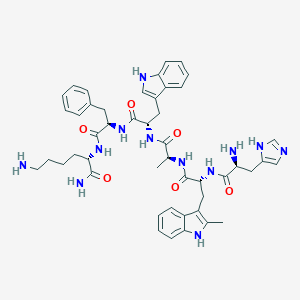Hexarelin, also called Examorelin, is a synthetic analogue of ghrelin and is closely related to GHRP-6. In fact, hexarelin and GHRP-6 differ from each other only slightly thanks the addition of two methyl groups to GHRP-6. Hexarelin, like many ghrelin analogues, is orally and sublingually active and highly selective. Hexarelin has been heavily researched for its effects on heart cell survival following ischemia and nutrient deprivation.

Hexarelin directly affects the heart by binding to the CD36 receptor and the growth hormone secretagogue receptor (GHSR). Studies in mice suggest hexarelin protects heart cells from injury in the setting of heart attack by binding to these receptors and preventing cells from undergoing apoptosis (programmed cell death). Mice treated with hexarelin in this study showed improved heart function, increased number of surviving heart cells, and decreased production of malondialdehyde (a marker of heart cell death). Interestingly, GHRP-6 was found to be slightly superior to ghrelin in this study[1], [2].
Improves Fat Measures
Dyslipidemia refers to an abnormal amount of fat in the blood. Interestingly, dyslipidemia is an independent risk factor for the development of diabetes, even in thin and outwardly healthy individuals. In fact, dyslipidemia may help to explain the current diabetes crisis in first-world nations and understanding its effects on human physiology is paramount to combating the growing health concerns associated with modern diets. Research in rats indicates that GHRP-6 can correct dyslipidemia in the setting of insulin resistance (the first step in the pathway to diabetes) while simultaneously lowering blood sugar and insulin resistance[9]. The peptide may offer an alternative to current lipid medications for the treatment of severe dyslipidemia.
Heart disease is the leading cause of death in most developed nations. Understanding the complex process that leads to heart disease, heart failure, and eventually death is not easy, but scientists are beginning to unravel the mystery with help from peptides like hexarelin. Research utilizing hexarelin has revealed a number of new pathways for understanding the function of the heart in health and disease. It has also opened the door to develop new treatments for problems, like cardiac remodeling, that have proved difficult to treat in the past.